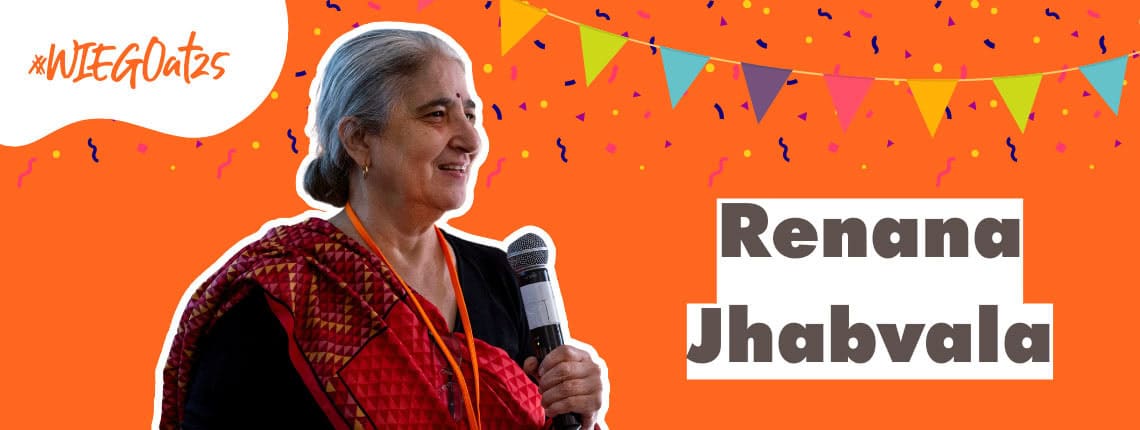In this interview, Renana Jhabvala, co-founder of SEWA and former chair of WIEGO, talks about the historical relationship between both organizations, and the positive impact that collecting data and statistics has had on women’s work in India and beyond.
After its foundation in 1972, the Self-Employed Women’s Association (SEWA) identified the need to collect data on women working in the informal economy, at a time when these workers were completely invisible both in statistics and public policies.
The women SEWA works with are from a variety of sectors, from street vendors in urban and rural areas, to people who sell their labour and services, to women who have small businesses at home, as well as rural producers.
SEWA and WIEGO Collaborate to Improve Statistics on Informal Employment
While SEWA had started to collect data, it remained a concern that the contribution of workers in informal employment, especially women workers, to national economies was not sufficiently valued. Given it is an important source of employment for women, SEWA has long advocated for supportive policies on home-based work. In the mid-1990s, alongside other organizations of home-based workers, SEWA began campaigning for an international labour standard on homework at the International Labour Conference (ILC). Facing opposition from employer groups, SEWA’s founder Ela Bhatt believed that the campaign needed statistics to highlight the significance of home-based work. She sought the help of Marty Chen (co-founder and former International Coordinator of WIEGO) and colleagues to compile all the data they could on home-based work. SEWA and homeworker organizations used the statistics to help convince delegates at the ILC that homeworkers were a significant part of the workforce, and the International Convention on Homework was adopted in 1996. This marked a major victory for workers in informal employment.
The successful advocacy for the ILO Convention on Homework planted the seed for the establishment of WIEGO. Recognizing the power of working together, representatives of SEWA and other experts on the informal economy from activist, research and statistical disciplines formed the global network called Women in Informal Employment: Globalizing and Organizing (WIEGO) in 1997. The development of statistics on the informal economy was and continues to be a primary focus for WIEGO.
As the years have passed, SEWA and WIEGO have continued to collaborate to improve statistics on workers in informal employment. SEWA requested the government of India to include WIEGO’s Statistical Team in a committee set up to gather information that would inform public policies on informal work, so that they could amend the questionnaires to [collect data and] facilitate outcomes that better reflected the needs of workers in the informal economy.
SEWA’s statistical work was so groundbreaking that “we were also able to influence [the] ILO, and now many countries are collecting this information on the informal economy,” recalled Jhabvala.
Creating and Documenting Impact Through a “Symbiotic” Relationship Between Workers, Activists and Academics
“We have done a number of different research [projects] with WIEGO – most recently [to understand] the impact of COVID on women in the informal economy. Then there are many case studies that have come out of SEWA and that have become part of WIEGO[‘s Publication Series].”
Raising the visibility of workers in the informal economy – and combining it with worker advocacy – has at times translated into policies that directly benefit workers. An example is India’s 2014 Street Vendors' Act, which protects vendors’ rights and regulates street vending activities in public areas.
Jhabvala explained how WIEGO and SEWA have managed to work together in a symbiotic relationship: “We bring an issue to WIEGO, WIEGO makes it international through academic circles or […entities] like the World Bank or the International Labour Conference, which then gives it more importance in the eyes of the government of India.”
Growing and Uniting Organizations of Workers in Informal Employment Across Borders
SEWA, as well as WIEGO, has supported the creation of international networks of workers in the informal economy: “We realized that informal workers faced the same issues around the globe, and that India’s domestic policies were more and more affected by international law and that it was crucial for us to get involved in the international arena,” said Jhabvala. Today there are global networks of domestic workers, home-based workers, street vendors and waste pickers.
The international reach of the WIEGO Network has benefited SEWA in a crucial way, said the union leader.
“A lot of our members have gained exposure thanks to WIEGO, which in turns improves the understanding of issues abroad and sometimes [they] also find out solutions, like for example, street vendors went to Thailand and wanted to reproduce the kind of carts they had there.”
Organizing & Better Policies for Women Workers: Future Priorities for SEWA
Looking ahead, she insisted on the need to keep advocating for better policies supporting women workers: “Women’s work is still invisibilized and less paid. There are also new generations with higher literacy and education levels – everybody now has primary education, many girls have secondary education as well as college – but they're not able to enter the workforce.”
With SEWA's constantly increasing membership of over 2.5 million poor, self-employed women workers from the informal economy across 18 states in India, Jhabvala still hopes to reach new areas within India. “We have spread to all parts of India because we understand how to make women think of themselves as workers and want to join a movement.”
